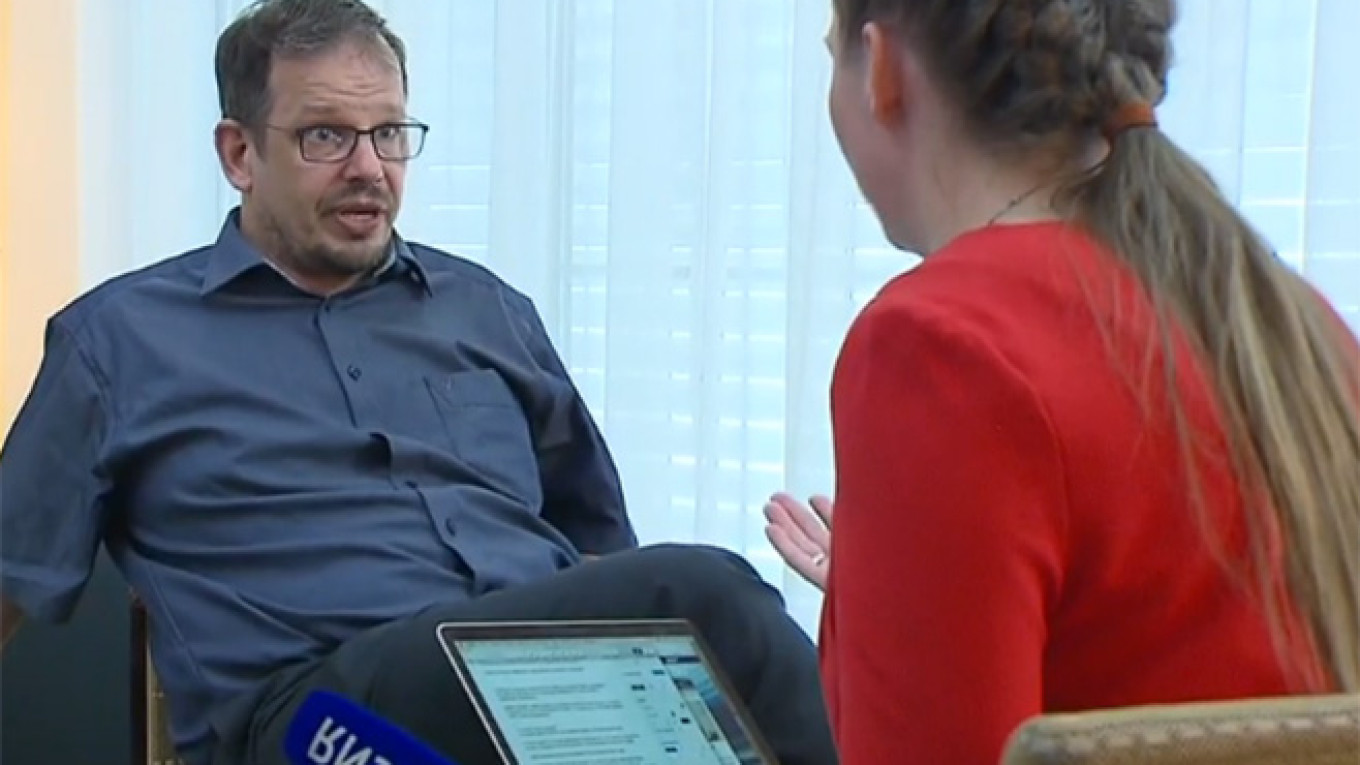Hajo Seppelt, the German journalist behind the recently released ARD documentary on doping in Russian sports, allegedly threatened political commentator Olga Skabeyeva and her crew from state television channel Rossia 1 during an interview in Germany, the Vesti news website reported Friday.
Skabeyeva and her crew flew to Germany to interview Seppelt, and asked him to provide the records he used to make his report on the Russian government’s involvement in the ongoing doping scandal. What starts out as a normal interview becomes, as shown in the video, a series of alleged threats, harassment, and pursuit.
However, the transition between these two very different tones is not clearly shown, and the Rossia 1 segment appears to show an aggressive Seppelt and a victimized Skabeyeva, without clearly representing the entirety of the situation.
The beginning of the interview shows Skabeyeva asking him to see the records in question. He replies that he does not have them with him, and is surprised by the request.
In both Germany and Russia, shield laws protect journalists from being required to share their sources, even with government officials. In Russia, a court mandate can force a reporter to share their sources, but in Germany, even the courts cannot require this of a reporter. However, Skabeyeva continues to ask him for his records throughout the clip.
The reason Skabeyeva cites for her requests is that it is “very important for us” as “we might not be able to go to the Olympics.” Seppelt replies that this has nothing to do with her, asking her if she is friends with the athletes. She says that she is trying to be “a friend to her country,” to which he replies that her role as a journalist means that she shouldn’t be a friend to her country but should remain independent.
In the little footage shown of the actual interview, Skabeyeva asks Seppelt a seemingly leading question about whether he has been paid to make these documentary films. Seppelt tells her that he is a journalist calling on others to investigate for themselves, not someone’s agent.
The video mentions that there was about five minutes of back-and-forth, “without any idiotic questions,” but does not show this footage. Instead, it cuts to footage of Seppelt asking them to leave while taking the microphone and the tripod and putting them outside the door.
Skabeyeva asks why is he is acting aggressively while herself continuing to demand the records. Seppelt then calls her a “stupid Russian journalist who is proud of her country,” even though it has a system steeped in “cheating and corruption.”
Skabeyeva is next seen asking to be let back upstairs to retrieve her purse, and Seppelt covers the camera with his hand. It appears that he has hit the camera because a clapping sound is heard, and Skabeyeva gasps loudly. However, the following portion shows them outside the building, Skabeyeva with purse in hand, and the camera seemingly in normal condition.
Once outside, they claim that he took their camera and microphone, and started following them. However, he is never shown holding a camera, and only holds the microphone windscreen while Skabeyeva remains in possession of her microphone, and the video continues to be filmed.
In the video, Seppelt can be seen walking behind Skabeyeva and her camera assistant down the street. At certain points, this “pursuit” is filmed from behind Seppelt himself, making it unclear who exactly is following who. She claims that this went on for 30 minutes, however the footage is all filmed in what appears to be the same one or two blocks near his hotel.
At the end of the video, Seppelt stops and begins walking away from Skabeyeva and her team while they follow him. He is shown on the phone, allegedly with the police, to whom he supposedly says that he is being followed by journalistic imposters who are intruding on his space. Skabeyeva insists that her team is being followed, not Seppelt.
Seppelt has yet to make a statement portraying his version of the events.
Seppelt’s film in question, “Doping Secret: Showdown for Russia,” was released by German broadcaster ARD/WDR on Wednesday night. It is the second installment of their investigation into the Russian doping scandal. Read more about it? here.
Seppelt and former director of Russia’s anti-doping lab, Grigory Rodchenkov, have both recently alleged the existence of a government-sponsored program that is involved in providing athletes with performance-enhancing drugs. The Kremlin has consistently condemned these accusations as “absolute slander” intending to harm Russia.
A Message from The Moscow Times:
Dear readers,
We are facing unprecedented challenges. Russia's Prosecutor General's Office has designated The Moscow Times as an "undesirable" organization, criminalizing our work and putting our staff at risk of prosecution. This follows our earlier unjust labeling as a "foreign agent."
These actions are direct attempts to silence independent journalism in Russia. The authorities claim our work "discredits the decisions of the Russian leadership." We see things differently: we strive to provide accurate, unbiased reporting on Russia.
We, the journalists of The Moscow Times, refuse to be silenced. But to continue our work, we need your help.
Your support, no matter how small, makes a world of difference. If you can, please support us monthly starting from just $2. It's quick to set up, and every contribution makes a significant impact.
By supporting The Moscow Times, you're defending open, independent journalism in the face of repression. Thank you for standing with us.
Remind me later.


